Home Tags Posts tagged with "nigeria"
nigeria
At least 21 people have been killed and other 52 injured in a bomb attack on Banex Plaza shopping center in Nigeria’s capital, Abuja.
The explosion, near the popular Banex plaza shopping complex in Wuse district, could be heard from miles away and sent plumes of smoke into the air.

At least 21 people have been killed and other 52 injured in a bomb attack on Banex Plaza shopping center in Nigeria’s capital, Abuja
Government spokesman Mike Omeri confirmed the blast was the result of a bomb.
No claims of responsibility have been reported.
Islamist militant group Boko Haram has bombed targets across northern Nigeria in recent years.
Boko Haram has staged previous attacks in Abuja, but most of its targets have been in the north-east of the country.
In April, more than 70 people were killed in a bomb blast at a bus stop on the outskirts of the capital in an attack claimed by Boko Haram.
Boko Haram also said it was behind a car bomb attack near a bus station in the suburbs in May, which killed at least 19 people and injured 60 others.
[youtube 0W9kNGnh0Gs 650]
A huge explosion rocked an area near Banex Plaza shopping centre in the Nigerian capital Abuja on Wednesday, two witnesses said.
The blast hit Abuja’s Wuse 2 district, reports said.
It is not yet clear what was behind the explosion. Emergency services are attending the scene.
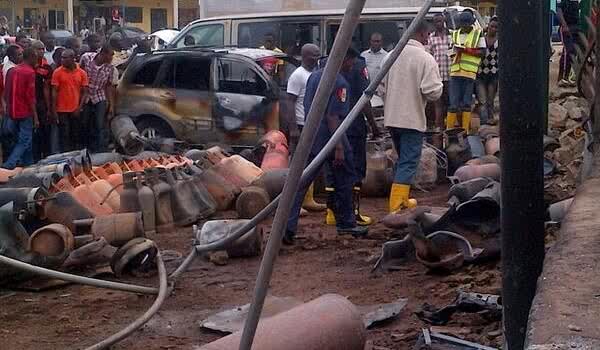
Boko Haram has staged previous attacks in Abuja, but most of its targets have been in the north-east of the country
Nigeria, including the capital, has experienced several bomb attacks in recent months. Many places have been targeted by the radical Islamist group Boko Haram.
Manzo Ezekiel, spokesman for the National Emergency Management Agency, told AFP news agency: “You can see smoke billowing from the sky. It’s a very crowded place.”
One witness said the blast shattered shop windows, and that people could be seen running out of the shopping centre with blood on their clothes.
Boko Haram has staged previous attacks in Abuja, but most of its targets have been in the north-east of the country.
In April, more than 70 people were killed in a bomb blast at a bus stop on the outskirts of the capital in an attack claimed by Boko Haram.
In May, a car bomb near a bus station in the suburbs killed at least 19 people and injured 60 others.
The group has hit Abuja several times before, including an attack on the UN national headquarters in 2011.
Three of Nigeria’s high-ranking traditional leaders today came under heavy bombardment from Boko Haram militants while on their way to the burial of the late Emir of Gombe, Shehu Usman Abubakar.
While the Emir of Gwoza, Alhaji Idrissa Timta was shot dead on the spot, that of Uba, Alhaji Ismaila Ibn Mamza and Alhaji Abdullahi Mohammed Ibn Askirama II, Emir of Askira escaped into nearby bush with bullet wounds.
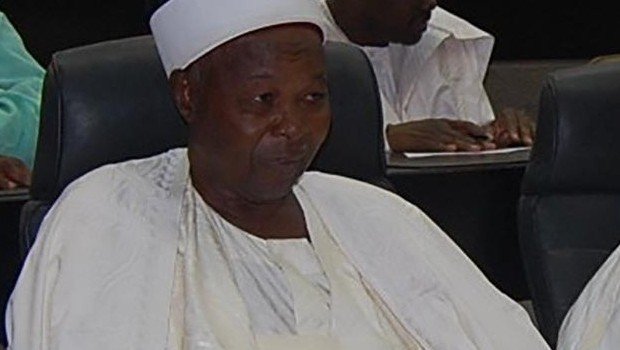
His Royal Highness, the Emir of Gwoza, Alhaji Idrissa Timta was killed following an attack by some gunmen believed to be members of the Boko Haram
According a reliable source in Maiduguri, the three traditional rulers drove in the official vehicle of the Emir of Gwoza along with their convoy which also include police escort. They however came under attack by armed men who fired bullets sporadically on the convoy, targeting the three traditional rulers.
Nigeria’s President Goodluck Jonathan vowed to wage “total war” against the group, which has been held more than 200 girls captive since last month.
Borno state government confirmed the attack and said the gunmen were believed to be Boko Haram members, Reuters news agency reports.
Traditional rulers have been targeted for assassination by Boko Haram before, but attacks on them are rare.
Emirs, who command a lot of respect in the north, have taken a stand against the militants.
Boko Haram has been accused of killing at least 17 people in an attack on Alagarno, a village in north-east Nigeria, close to Chibok, where hundreds of schoolgirls were seized.
It comes a day after 118 people died in a double bombing in the central city of Jos, also blamed on Boko Haram.
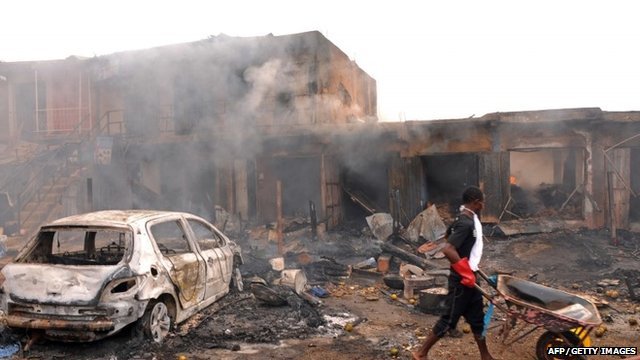
Alagarno attack comes a day after 118 people died in a double bombing in the Nigerian city of Jos (photo AFP/Getty Images)
In the latest attack, Boko Haram fighters reportedly spent hours killing and looting in the village of Alagarno.
Alagarno is near Chibok, from where the schoolgirls were abducted last month.
The abductions of more than 200 girls caused international outrage and prompted foreign powers to send military advisers to assist Nigeria’s army.
People in north-east Nigeria are extremely vulnerable to attacks because many areas are no-go zones for the military and the insurgents operate freely, correspondents say.
[youtube rfm6GlKIPBI 650]
Two bomb explosions killed at least 46 people in the central Nigerian city of Jos, police say.
The first blast was in a busy market and the second went off outside a nearby hospital.
No group has said it carried out the attack but Boko Haram militants have carried out a spate of recent bombings.
Jos has also seen deadly clashes between Christian and Muslim groups in recent years.
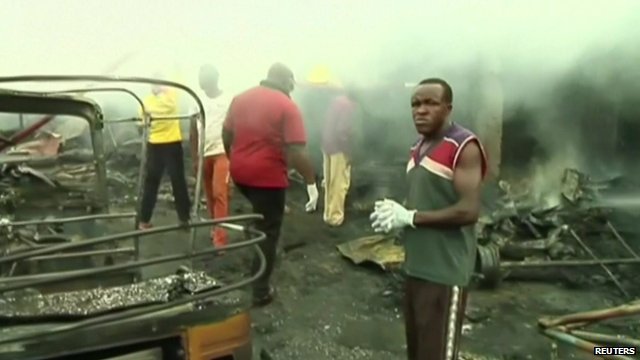
Two bomb explosions killed at least 46 people in the central Nigerian city of Jos (photo Reuters)
A spokesperson for the regional governor told AFP news agency that most of the victims were women. The market and bus terminal are part of the commercial centre of Jos.
The second blast was some 30 minutes after the first and killed some rescue workers.
President Goodluck Jonathan condemned the attack as a “tragic assault on human freedom”.
“President Jonathan assures all Nigerians that the government remains fully committed to winning the war against terror and… will not be cowed by the atrocities of enemies of human progress and civilization,” his office said.
Although Boko Haram has previously targeted Jos, the capital of Plateau state, the city has been relatively calm for almost two years.
Plateau state lies on the fault-line which divides Nigeria’s largely Muslim north from its mainly Christian south.
The state has witnessed violence blamed on land disputes between semi-nomadic Muslim Fulani herdsmen and mainly Christian Berom farmers.
Nigeria is also currently trying to trace more than 200 girls captured by Boko Haram in April from a boarding school in the north-eastern town of Chibok.
[youtube 7H0TpWyaCek 650]
The Nigerian government has decided to shut schools and government offices across the capital Abuja, while a World Economic Forum conference takes place next week.
A big security operation is being promised to protect more than 1,000 delegates at the three-day meeting, after two deadly bomb attacks in Abuja.
An explosion late on Thursday killed 19 people, two weeks after a nearby bombing left 75 dead.
Islamist militant group Boko Haram is being blamed for the violence.
The same group is believed to be behind the kidnapping of more than 200 teenage girls from their school in Borno state in north-eastern Nigeria more than a fortnight ago.
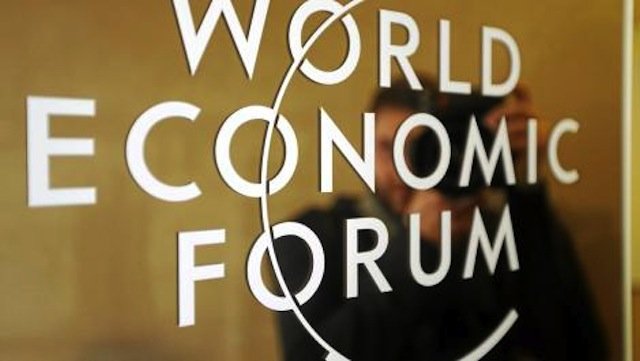
The World Economic Forum Annual Meeting 2014 will take place in Abuja from May 7 to May 9
The group, whose name means “Western education is forbidden” in the local Hausa language, has staged a wave of attacks in northern Nigeria in recent years, with an estimated 1,500 killed in the violence and subsequent security crackdown this year alone.
President Goodluck Jonathan’s government says 5,000 police and soldiers will be deployed for the World Economic Forum on Africa, which begins on Wednesday.
Chinese Premier Li Keqiang and the presidents of Rwanda, Senegal and Kenya will be among international as well as African figures at the forum.
While the official reason for closing all schools and government offices in Abuja is to ensure traffic flows smoothly, tightening security is also a likely reason.
Fewer vehicles on the roads should enable stricter searches and cut the number of potential targets for further bomb attacks, he adds.
“The government has taken the strongest measures to ensure a safe forum. We ask participants not to let terror win,” Finance Minister Ngozi Okonjo-Iweala said in a statement.
In a separate development, the US embassy has warned its citizens of a planned “unspecified attack” on one of two Sheraton hotels in Lagos.
The finance minister said the security measures were aimed at calming nerves but told Nigerian media the focus on returning the abducted girls to their families was “much more important”.
Boko Haram has not made any response to the accusation that its fighters abducted the girls from the school in Chibok town in the middle of the night on April 14.
Since the kidnapping, parents have criticized the government’s search and rescue efforts.
The police chief in Borno state has put the number of missing girls at 223 and has appealed to parents to come forward with photographs of their daughters to confirm who has been seized. According to the police commissioner, 53 of the girls are believed to have escaped.
It is thought that the militants initially took the girls to the Sambisa forest; there have been subsequent reports they have been taken over the borders into Chad and Cameroon and possibly forced to “marry” the insurgents.
[youtube d_2yLLy4AKM 650]
Boko Haram gunmen abducted around 100 schoolgirls in an attack on a school in north-east Nigeria, officials say.
The attackers reportedly arrived at the school in Chibok, Borno state, late last night, and ordered the hostel’s teenage residents on to lorries.
The attackers are believed to be from the Islamist group, Boko Haram, whose militants frequently target schools.
On Monday, bombings blamed on the group killed more than 70 people in the capital, Abuja.

Boko Haram gunmen abducted around 100 schoolgirls in an attack on a school in north-east Nigeria
Boko Haram, whose name means “Western education is forbidden” in the local Hausa language, has been waging an armed campaign for an Islamic state in northern Nigeria.
The exact number of missing students had yet to be established, as some of the girls had managed to return to their homes.
“Many girls were abducted by the rampaging gunmen who stormed the school in a convoy of vehicles,” AFP news agency quotes Emmanuel Sam, an education official in Chibok, as saying.
Another witness, who requested anonymity, told AFP that gunmen overpowered soldiers who had been deployed to provide extra security ahead of annual exams.
The schoolgirl said the men loaded the food items in the store into a truck and ordered some of the girls to climb in.
The other girls were packed into a bus and two other trucks, one carrying sacks of food and the other petrol.
The girl said the convoy had passed about three villages when the truck she was in developed a fault and was forced to slow down.
This gave her and about 10 to 15 other girls the opportunity to jump off and escape into the bush.
Nigerian media reported that two members of the security forces had been killed, and residents said 170 houses were burnt down during the attack.
Boko Haram emerged as a critic of Western-style education, and its militants frequently target schools and educational institutions.
This year, the group’s fighters have killed more than 1,500 civilians in three states in north-east Nigeria, which are currently under emergency rule.
The Nigerian government recently said that Boko Haram’s activities were confined to that part of the country.
At least 135 civilians have been killed by gunmen in north east Nigeria since Wednesday, Borno state senator Ahmed Zannah said.
Senator Ahmed Zannah said the killings took place in at least three separate attacks in the state.
The attackers are suspected to be from the Islamist Boko Haram movement.
At least 1,500 people, half of them civilian, have been killed in the restive north-eastern region this year, according to Amnesty International.
Amnesty International blamed both “an increase in attacks by Boko Haram and uncontrolled reprisals by Nigeria’s security forces” for the high death toll.

Boko Haram has been accused of numerous attacks in northern Nigeria
Senator Ahmed Zannah said the attackers first target was a teacher training college in the town of Dikwa.
They killed five people there and abducted several women, he said.
The attackers burned down the college library before escaping, Ahmed Zannah said.
Boko Haram militants then attacked two villages near the border with Cameroon killing a further 130 people, the senator said.
The attacks took place on Wednesday and Thursday, with initial reports claiming around 70 people had been killed.
The Nigerian military has not yet commented on the attacks.
A state of emergency has been in place since last year in the states of Borno, Yobe and Adamawa in north-east Nigeria.
Human rights groups have criticized both Boko Haram and Nigeria’s military for failing to protect civilians.
Amnesty International said last month that Nigeria’s army killed around 600 people after a Boko Haram attack.
Some 250,000 people have been forced to leave their homes because of the fighting, the Nigerian government’s relief agency said.
Boko Haram militants have attacked a military airbase in Maiduguri, north-eastern Nigeria, destroying two helicopters, the authorities say.
Eyewitnesses say hundreds of militants attacked several areas of the city of Maiduguri, starting early on Monday.
A 24-hour curfew has been imposed in Maiduguri. Its civilian airport was also briefly closed.
Thousands of people have been killed since 2009, when Boko Haram launched its campaign to install Islamic law.
In May, a state of emergency was declared in Borno state, of which Maiduguri is the capital, as well as two neighboring states, while there has been a massive military deployment to the worst-affected areas.
Ministry of Defence spokesman Brig Gen Chris Olukolade said in a statement that two helicopters and three decommissioned military aircraft had been “incapacitated” during the attack which had been repelled.
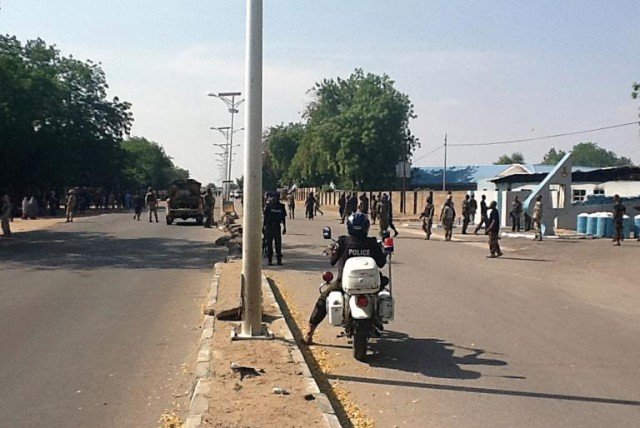
Boko Haram militants have attacked a military airbase in Maiduguri destroying two helicopters
He said some army bases had also been targeted, while 24 insurgents had been killed and two soldiers wounded.
Local residents told the AFP news agency that hundreds of heavily armed Islamist gunmen besieged the air force and army bases, razing buildings and setting shops and petrol stations ablaze.
“I saw two air force helicopters burnt,” a local official told AFP.
Bomb and gun attacks were carried out in Maiduguri, an AFP reporter in the city said.
A resident said: “We heard women and children in the barracks crying and wailing. At the gate, I saw some vehicles destroyed and the checkpoint there in shreds.”
There are reports of military checkpoints being attacked in different parts of the city.
Some eyewitnesses told the AP news agency they had seen bodies with their throats slit.
Others said several vehicles had been driven out of the air base carrying the bodies of victims.
Government and military officials said scores of people may be dead, AP reported.
Nigerian Islamist militant group Boko Haram is to be named as a foreign terrorist organization by the US state department.
The move, expected to take place on Wednesday, means US regulatory agencies are instructed to block business and financial transactions with Boko Haram.
It will become a crime under US law to provide material support to the group.
Boko Haram wants to impose Islamic law in northern Nigeria and has been blamed for thousands of deaths.
The group began its insurgency in 2009, and targets both the military and civilians, including schools, and frequently clashes with the Nigerian armed forces.
While Boko Haram’s main focus is Nigeria, the US has cited links to the al-Qaeda affiliate in West Africa, and extremist groups in Mali.
The US state department has not formally announced its decision to brand the group a terrorist organization.
However, the Associated Press news agency cited an unnamed US official, whilst Reuters quoted congressional sources and others briefed on the matter.
Nigeria’s government declared Boko Haram and another militant group Ansaru as terrorist organizations in June, warning that anyone who helps them will face a minimum prison sentence of 20 years.
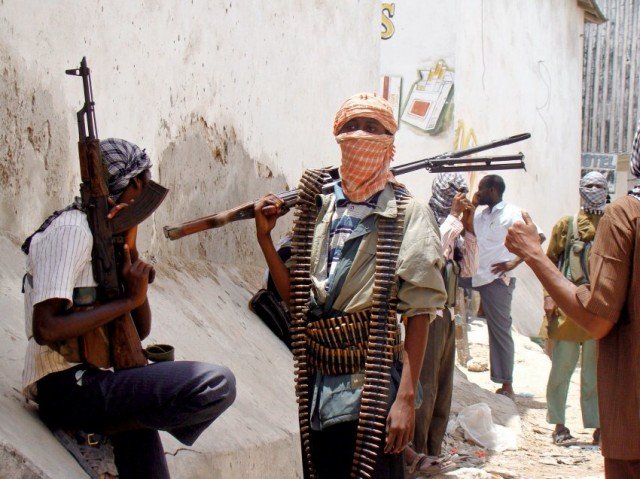
Nigerian Islamist militant group Boko Haram is to be named as a foreign terrorist organization by the US state department
The US’s decision will be welcomed by the Nigerian government and the Christian Association of Nigeria, which has long been campaigning for the US to declare Boko Haram a terrorist group.
The Obama administration had so far refused, fearing that it could give Boko Haram greater legitimacy in global jihadi circles.
The US is unlikely to identify Boko Haram’s financial backers, when the Nigerian government has up to now failed to do so.
Last year, top US diplomat for Africa Johnnie Carson said Boko Haram exploited popular discontent in northern Nigeria, and the government needed to tackle the political and economic grievances of the mainly Muslim population in the region.
However, Johnnie Carson acknowledged “reports of contact and growing relationships between elements of Boko Haram and other extremists in Africa, including al-Qaeda in the Islamic Maghreb”.
In August 2011, an attack on a UN building in Abuja, Nigeria, marked a turning point as a threat to US interests.
Last year, Lisa Monaco – now the chief counter-terrorism adviser to President Barack Obama – sent a letter to the state department saying Boko Haram met the criteria to be listed as a “foreign terrorist” group because, she said, it either engages in terrorism that threatens the US or has a capability or intent to do so.
The US state department later designated three alleged Boko Haram leaders as terrorists, but stopped short of a wider declaration against the group.
Boko Haram:
- Founded in 2002
- Official Arabic name, Jama’atu Ahlis Sunna Lidda’awati wal-Jihad (People Committed to the Propagation of the Prophet’s Teachings and Jihad)
- Initially focused on opposing Western education
- Nicknamed Boko Haram, a phrase in the local Hausa language (Western education is forbidden)
- Launches military operations in 2009 to create an Islamic state across Nigeria
- Founding leader Mohammed Yusuf killed in same year in police custody
- Succeeded by Abubakar Shekau, who the military wrongly claimed in 2009 had been killed
- Suspected to have split into rival factions in 2012
- Military claims in August 2013 that Abubakar Shekau and his second-in-command Momodu Bama have been killed in separate attacks; no independent confirmation of claim
Nigerian Boko Haram leader Abubakar Shekau may have been killed by the security forces during a shoot-out, an army spokesman has said.
An “intelligence report” showed that Abubakar Shekau, the leader of the Boko Haram group, may have died between July 25 and August 3, Lt-Col Sagir Musa said.
Boko Haram, which has waged an insurgency in Nigeria since 2009, has not commented on the statement.
The US had put a bounty of $7 million on Abubakar Shekau’s head.
The intelligence report suggested that Abubakar Shekau was shot on June 30, when soldiers raided a Boko Haram base at Sambisa Forest in north-eastern Nigeria.
“Shekau was mortally wounded in the encounter and was sneaked into Amitchide – a border community in Cameroon for treatment… It is greatly believed that Shekau might have died between 25 July to 3 August 2013,” Sagir Musa said.
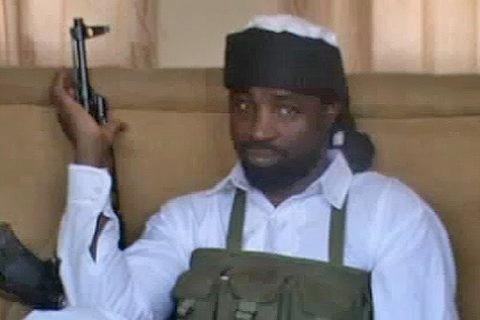
Nigerian Boko Haram leader Abubakar Shekau may have been killed by the security forces during a shoot-out
A video of Abubakar Shekau released on August 13 was “dramatized by an imposter to hoodwink the sect members to continue with the terrorism”, he added.
On August 14, the military said it had killed Boko Haram’s second-in-command, Momodu Bama, also known by his alias “Abu Saad”.
Correspondents say there is no independent confirmation of Abubakar Shekau’s or Momodu Bama’s death.
Thousands of people have died since Boko Haram began its insurgency in 2009.
A claim in 2009 that Abubakar Shekau had been killed turned out to be untrue, they add.
He became leader of Boko Haram after its founder, Muhammad Yusuf, died in police custody in the same year.
The insurgency became far more brutal under Abubakar Shekau’s leadership, with Boko Haram carrying out a wave of bombings and abductions, including that of foreigners, in its campaign to create an Islamic state across Nigeria, correspondents say.
In May, Nigeria’s President Goodluck Jonathan declared an emergency in three north-eastern states, saying the group threatened the country’s existence.
Google has launched Gmail SMS, a text message-based version of its email service, in some of the African countries.
Gmail SMS can run on so-called “dumb phones” which only have very basic features and no access to the internet.
The service has so far been made available in Ghana, Nigeria and Kenya.
Gmail SMS is the latest in a line of Google products aimed at the African market – the company is also running educational programmes in the region.

Gmail SMS can run on so-called "dumb phones" which only have very basic features and no access to the internet
Google describes its efforts in improving computer science training as “an important goal for Google in 2012”.
It recently offered grants to 17 universities to expand its Computer Science for High School project.
However lack of access to affordable hardware is still seen as a critical barrier to technology adoption across the continent.
Geva Rechav, Google’s product manager for emerging markets, explained in a blog post how Gmail SMS was adapted to work by using simple text commands.
“Gmail SMS works on any phone, even the most basic ones which only support voice and SMS,” he wrote.
“Gmail SMS automatically forwards your emails as SMS text messages to your phone and you can respond by replying directly to the SMS.
“You can control the emails received by replying with commands such as MORE, PAUSE and RESUME.
“Additionally, compose a new email as an SMS and send to any email address recipient – who will find your message in the right email conversation thread!”
It will be free to receive messages from the system, but any sent texts will be subject to standard network rates.
Across Africa, adoption of mobile services has been swift and widespread.
Mobile commerce offerings like microfinancing tool M-Pesa have in excess of 15 million users.
Nigeria’s oil regulator has asked industry giant Shell to pay $5 billion for the Bonga oil spill from last December.
The disclosure was made during a parliamentary hearing on the matter.
A leak at the Bonga field during a transfer of oil to a tanker led to 40,000 barrels spilling into the Atlantic Ocean.
A Shell spokesperson said there was no need for a fine as everything had been done to prevent environmental damage.

Nigeria's oil regulator has asked industry giant Shell to pay $5 billion for the Bonga oil spill
The Bonga field, operated by Shell Nigeria Exploration and Production Company (SNEPCO), is approximately 120 km (75 miles) offshore and produces 10% of Nigeria’s oil exports.
The spill was contained before it reached the shore.
The head of Nigeria’s National Oil Spill Detection and Response Agency urged MPs on the House of Representatives’s environment committee to approve his proposal.
“Although adequate containment measures were put in place to combat the Bonga oil spill, it however posed a serious environmental threat to the offshore environments,” Peter Idabor said.
“The people could not fish after a long period after the spill,” he said.
“So that’s why we are looking at the damages. If the people said they will not pay, so be it. But we want to make it very clear that it’s wrong for them to say they cannot pay. Are they denying that they spilled 40,000 barrels of crude oil into the waters?” he asked.
But Shell said it believed there no “basis in law for such a fine”.
“SNEPCO responded to this incident with professionalism and acted with the consent of the necessary authorities at all times to prevent environmental impact as a result of the incident,” a spokesperson for the Anglo-Dutch company said in a statement.
Most previous oil spills in Nigeria – one of the world’s biggest oil producers – have been onshore. Many have been caused by sabotage or militant attacks.
Last year, a UN report into spills in Ogoniland found that the region could take 30 years to recover.
In March, lawyers representing a fishing community in Ogoniland began a case against Shell in a London court over recent oil spills.
A Dana Air passenger plane with at least 162 people on board has crashed into a building in Nigeria’s main city of Lagos, officials say.
Witnesses told Reuters news agency they saw the Dana Air plane strike the two-storey building and burst into flames.
At least 162 people were thought to be on board, but the head of the Nigerian Civil Aviation Authority said he doubted any could have survived.
The crash took place in a neighborhood just outside the airport in overcast weather, reports said.
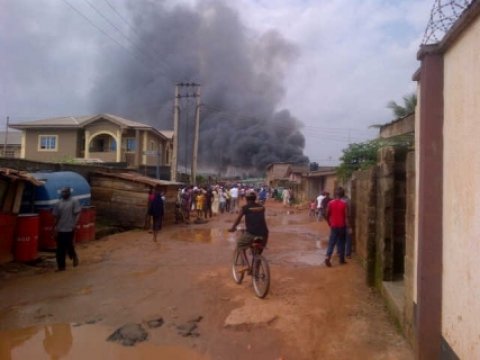
A Dana Air passenger plane with at least 162 people on board has crashed into a building in Nigeria's main city of Lagos
Federal emergency personnel were said to be on their way to the scene.
There were conflicting reports as to whether the flight was arriving in Lagos from the Nigerian capital, Abuja, or was leaving Lagos bound for Abuja when the crash happened.
Nigeria, like many African countries, has a poor air safety record, though some efforts have been made to improve it since a spate of airline disasters in 2005.
[youtube lp1diaXQWiQ]
Red Cross officials say at least 16 people have been killed in a gun and bomb attack at Bayero University in Nigeria’s northern city of Kano.
Six others were in a serious condition following the attack at Bayero University campus where Christian worshippers were holding a service.
Nigerian police are searching for the gunmen.
No group has said it launched the attack, but the violent Islamist Boko Haram group is active in Kano. It has recently attacked churches.
Nigeria’s central government has struggled to contain the militant group, which operates mainly in the predominantly Muslim north, but has also struck as far south as the capital, Abuja.
Sunday’s attack took place in one of the lecture theatres used as a place of worship by Christians.
A witness told AFP news agency the attackers had first thrown in explosives and fired shots, “causing a stampede among worshippers”.
“They now pursued them, shooting them with guns. They also attacked another service at the sporting complex.”
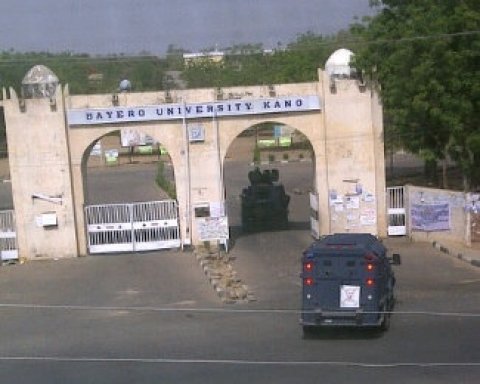
At least 16 people have been killed in a gun and bomb attack at Bayero University in Nigeria's northern city of Kano
Another witness spoke of “pandemonium”, and said he had seen two men shooting indiscriminately.
Mohammed Suleiman, a history lecturer at the university, said security guards had to run for their lives when the violence broke out.
“For over 30 minutes a series of bomb explosions and gun shots took over the old campus, around the academic blocks,” he told Reuters news agency.
A Red Cross spokesman said adults – possibly professors – and three women were among the casualties. Several needed urgent blood transfusions.
Kano state police spokesman Ibrahim Idris said that by the time police arrived, the attackers had “disappeared into the neighborhood”. A manhunt is under way.
But the situation at the university was now calm, according to the Red Cross spokesman.
Boko Haram carried out a bombing in Kano in January that killed more than 180 people, its deadliest attack to date.
Boko Haram
• 2002: Founded in Maiduguri
• July 2009: Hundreds of members killed when Maiduguri police stations stormed; police capture and kill sect leader Mohammed Yusuf
• Dec 2010: Bombed Jos, killing 80 people; blamed for New Year’s Eve attack on Abuja barracks
• Jun-Aug 2011: Bomb attacks on Abuja police HQ and UN building
• Dec 2011: Multiple bomb attacks on Christmas Day kill dozens
• Jan 2012: Wave of violence across north-east Nigeria; Kano bombing kills at least 180
Giulio Terzi, the Italian foreign minister, has asked British government to provide the “utmost clarity” around the failed bid to rescue Chris McManus and Franco Lamolinara, who were kidnapped and killed in Nigeria.
The Italian foreign minister has demanded details “in the next few hours”, an Italian news agency said, after accusations the UK did not inform Italy about the planned mission.
Islamist militants took British Chris McManus, 28, of Oldham, and Italian Franco Lamolinara, 48, hostage in north-west Nigeria last May.
The engineers died as Nigerian and UK forces tried to free them on Thursday.
UK Foreign Secretary William Hague and Giulio Terzi are attending a meeting in Denmark.
William Hague earlier said that the limited time available to make a decision “constrained how much we were able to consult others”.
Italian President Giorgio Napolitano said it was “inexplicable” that the British government had not told Rome about the rescue attempt until it had begun.
Giorgio Napolitano said the UK needed to explain why it did not inform the Italian authorities ahead of the operation.
“The way the British government has behaved is quite inexplicable. To have failed to inform or consult Italy, with regard to a military action which could have such consequences,” the Italian president said.
“A clarification is needed on both the political and diplomatic levels.”
UK Defence Secretary Philip Hammond said Rome had been told of intelligence behind the rescue attempt and informed “as the decision was taken to act”.
Philip Hammond said that the attempted rescue had been launched after information was received that Chris McManus and Franco Lamolinara “were about to be moved – possibly executed”.
He said what had subsequently happened was “very unfortunate but it’s completely explicable”.
“These hostages were taken, they were held at an unknown location for a very long period of time despite extensive efforts to track them down. And when a window of opportunity became available, a well-trained Nigerian force with British support, went in and tried to rescue them,” Philip Hammond said.
“The Italian government was kept informed throughout the operation as the intelligence emerged and then as the decision was taken to act… I don’t think they specifically approved it – they were informed of what was happening.”
Number 10 said earlier that no official complaint had been received from the Italian government, and the UK had not made an apology.
It said the UK and Italy had been in contact ever since the men were kidnapped on 12 May, 2011.
Prime Minister David Cameron’s official spokesman said: “We contacted the Italians yesterday as the operation was getting under way, but this was a very fast-moving situation.
“Our priority was to respond to the situation on the ground and to do everything we could to try and secure the safe release of the hostages.”
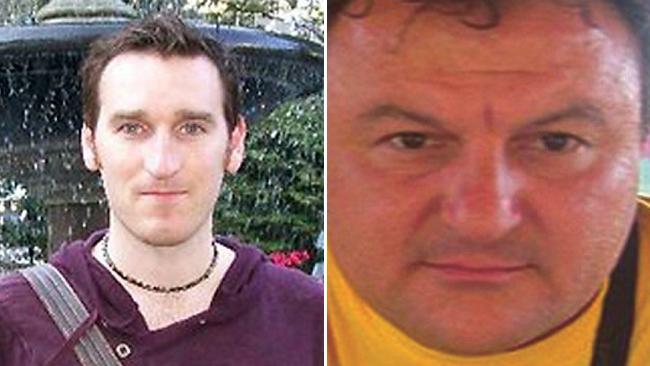
Islamist militants took British Chris McManus (left) and Italian Franco Lamolinara (right) hostage in north-west Nigeria last May
In a statement announcing the operation and the deaths of Chris McManus and Franco Lamolinara, PM David Cameron earlier said the decision to act had been taken at very short notice.
“A window of opportunity arose to try and secure their release. We also had reason to believe that their lives were under imminent and growing danger.”
It appeared that the Italian government tended to be in favor of negotiating in hostage situations, while Britain was absolutely against formal government negotiations.
News of the operation broke in a statement from the office of Italian Prime Minister Mario Monti.
It used very similar language to that used by the British side but made it clear the Italians were told the military was being used only after the operation had started.
Mario Monti chaired a meeting of a government security committee to discuss the failure of the attempt to rescue the hostages. The meeting ended after two hours without any comment being issued.
Commons Foreign Affairs Select Committee chairman Richard Ottaway said the UK was not duty-bound to tell Italy about the operation in the circumstances.
Richard Ottaway said: “I can understand the concerns and frustrations of Italian politicians but I think they’ve got to accept and recognize that these are very fast-moving, delicate operations and it’s not always possible to keep politicians briefed in advance of what goes on.”
Mario Monti’s office said he had asked Nigerian President Goodluck Jonathan to provide a “detailed reconstruction” of events as soon as possible.
David Cameron’s spokesman said it was a Nigerian-led operation, with UK support involving the UK’s elite Special Boat Service (SBS).
The house where the kidnapped men were being held had been under surveillance for some time.
David Cameron and Goodluck Jonathan said they believed the kidnappers had killed Chris McManus and Franco Lamolinara.
But an unnamed official from the Nigerian state security service quoted in local reports said the hostages died in the crossfire.
The Nigerian president described it as a “deeply sad and regrettable incident”.
Goodluck Jonathan said that the men’s captors had been seized and “would be made to face the full wrath of the law”.
The Nigerian president said they were from militant Islamist group Boko Haram, which has carried out a number of attacks on police, politicians and clerics who oppose it.
Reports have emerged that a senior member of Boko Haram was captured on Tuesday, and he gave information which led forces to the house where the two construction engineers were being held.
However, on Friday, a spokesman for the group told reporters Boko Haram was not responsible for the deaths.
“We have never taken anyone hostage. We always claim responsibility for our acts,” he said.
Boko Haram has become more violent and capable in recent years and there is a suspicion this may be a sign of the growing influence of the group al-Qaeda in the Islamic Maghreb.
Al-Qaeda in the Islamic Maghreb has a track record of kidnapping Westerners in North Africa and trying to extract ransom payments to fund its violence.
British Chief of Defence Staff General Sir David Richards said that the rescue attempt had sent “a shockwave” through al-Qaeda in the Islamic Maghreb.
“We know that all their leaders are now and disarray and we’re now obviously trying to track them down with our Nigerian allies,” David Richards said.
Gunmen seized Chris McManus and Franco Lamolinara in the town of Birnin Kebbi in the north of Nigeria on 12 May 2011.
Both men worked for Italian firm B Stabilini in the construction of a local headquarters for the Central Bank of Nigeria.
Relatives of Chris McManus released a statement saying they were “devastated” by his death but thanked those who had worked to try to free him.
“During this ordeal we have relied heavily on the support of our family and friends which has never waned and has enabled us to get through the most difficult of times,” the family statement said.
The UK Foreign Office advises against all travel to some areas of Nigeria and against all but essential travel to other areas, but these do not include the area where the men were kidnapped.
It says there is the threat of kidnap and terrorism across the West African country.
[youtube xqe2cfpH8kw]
At least three people have been killed in a suicide car attack at a church in the troubled central Nigerian city of Jos, sparking reprisals by Christian youths.
Witnesses said the suicide bomber drove his car into the prominent Church of Christ during morning prayers.
No group has claimed responsibility, but suspicion will fall on the radical Islamist sect Boko Haram.
The attack sparked a riot by Christian youths, with reports that at least two Muslims were killed in the violence.
The two men were dragged off their bikes after being stopped at a roadblock set up by the rioters, police said.
A row of Muslim-owned shops was also burned, an AFP reporter at the scene said.
Earlier, the suicide bomber smashed his car through unmanned gates towards the packed church, killing a woman in the process, witnesses said.
The explosives detonated close to where members of the congregation were attending a Sunday service, killing a father and his child.
At least 38 people had to be taken to hospital for treatment, the National Emergency Management Agency said.
The attack sparked immediate anger among Christian youths in the city.
They “were very angry and mobilized… and I overheard them saying they were going to avenge the attack,” one witness was quoted by the APF as saying.
Ethnic and religious tensions run high in Jos, the capital of Plateau state. Hundreds of people have died in bouts of sectarian clashes over the last few years.
But Christian human rights activists suspect Boko Haram of carrying out Sunday’s attack, which they say is the deadliest on a church in Jos.
The group has carried out a number of bloody attacks across Nigeria in its quest to overthrow the government and create an Islamic state.
Boko Haram has admitted attacking several churches across the country on Christmas Day 2011, killing nearly 40 people at one church outside the capital, Abuja, alone.
It has also claimed responsibility for a string of bomb blasts around Jos on Christmas Eve 2010 that killed at least 80 people.
158 suspected members of the Islamist Boko Haram organization has been arrested in raids in the northern city of Kano by Nigerian forces.
Boko Haram said it carried out a series of bombings in Kano last Friday in which at least 185 people died.
The organization says it wants to overthrow the Nigerian government and impose Islamic law.
There were two casualties from Tuesday’s dawn raids, carried out by the Nigerian Joint Military Task Force.
One resident of Kano said officers had encircled a house where a Boko Haram suspect was believed to be hiding. The shoot-out lasted several hours.
“They began shooting, and he fired back… This was followed by a barrage of gunfire by the security men,” Mohammed Maikubi Bala told AFP news agency.
A man and his wife were killed in the raid, residents said.

158 suspected members of the Islamist Boko Haram organization has been arrested in raids in the northern city of Kano by Nigerian forces
Attacks by Boko Haram killed close to 1,000 people last year, according to campaign groups Amnesty International and Human Rights Watch.
In a statement released on Tuesday, Amnesty said the Nigerian government should do more to tackle the group.
“The Nigerian government has repeatedly failed to prevent, investigate, prosecute or punish these acts,” it said.
The key suspect in a Christmas Day bombing on a Catholic church – believed to be a member of the Islamist sect Boko Haram – escaped from police custody earlier this month.
At least 40 people died in that attack.
A top African Union official warned that the radical sect was escalating its activities.
“The possibility of this group expanding its activities into the neighboring countries, deep into the Central African region should not be discarded,” said Francisco Caetano Jose Madeira, in charge of counter terrorism co-operation for the AU.
President Goodluck Jonathan has announced an immediate drop in the price of fuel, following a week of strikes and protests in Nigeria.
Goodluck Jonathan said the price would drop by around 30% in recognition of the “hardships being suffered” by people.
Nigeria has been paralyzed by strikes and protests over the government’s decision to scrap fuel subsidies.
The removal of subsidies from 1 January caused petrol prices to rise from 65 naira ($0.40) to 140 naira.
The unions have yet to respond to Goodluck Jonathan’s announcement.
Earlier, they called off street protests due to security concerns, but warned that a week-long general strike would continue.
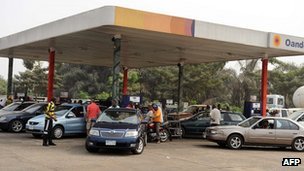
Nigeria’s President Goodluck Jonathan said the price would drop by around 30 per cent in recognition of the "hardships being suffered" by people
President Jonathan has admitted there has been a near breakdown in law and order in parts of the country as a result of the strike.
Army checkpoints have been seen in parts of the commercial capital Lagos for the first time since the protests began.
The strike has already cost the economy billions of dollars in lost revenue.
“Government will continue to pursue full deregulation of the downstream petroleum sector,” Goodluck Jonathan said in a televised national address.
“However, given the hardships being suffered by Nigerians, and after due consideration and consultations with state governors and the leadership of the National Assembly, government has approved the reduction of the pump price of petrol to 97 naira [about $0.60] per litre.”
Goodluck Jonathan’s speech comes after a weekend of talks with the unions failed to prevent the strike from continuing into a second week.
Abdulwaheed Omar, president of the Nigeria Labour Congress union, said he would urge his members to “stay off the streets… because of the security situation” but stressed the nationwide strike would continue.
Protests over five days last week led to the deaths of several people. Some 600 people were wounded, according to the International Red Cross.
The removal of fuel subsidies on 1 January was a devastating blow to the large number of Nigerians who live in absolute poverty.
The authorities say the subsidy was costing the equivalent of more than $8 billion a year, arguing that the money would be better spent on infrastructure and social services.
Oil accounts for some 80% of Nigeria’s state revenues but after years of corruption and mismanagement, it has hardly any capacity to refine crude oil into fuel, which has to be imported.
Trade unions in Nigeria have announced an indefinite strike and mass demonstrations unless the removal of a fuel subsidy is reversed.
The fuel subsidy’s withdrawal has led petrol prices to more than double since Monday, prompting anger countrywide.
“We have the total backing of all Nigerian workers on this strike and mass protest,” said the Nigeria Labour Congress’s Chris Uyot.
Nigeria is Africa’s biggest oil producer, but imports refined petrol.
Both the NLC and the Trades Union Congress (TUC) have agreed to the strike.
NLC spokesman Chris Uyot told the BBC’s Focus on Africa programme there was no room for dialogue with the government, which has said it will spend the money saved by removing the subsidy on improving the country’s erratic electricity supply, as well as on health and education.

Trade unions in Nigeria have announced an indefinite strike and mass demonstrations unless the removal of a fuel subsidy is reversed
Prices have increased from 65 naira ($0.40) per litre to at least 140 naira in filling stations and from 100 naira to at least 200 on the black market, where many Nigerians buy their fuel.
“After exhaustive deliberations and consultations with all sections of the populace, the NLC, TUC and their pro-people allies demand that the presidency immediately reverses fuel prices to 65 naira,” a statement signed by the heads of the two unions said.
If the government failed to do so, “all offices, oil production centres, air and sea ports, fuel stations, markets, banks, amongst others will be shut down” from Monday 9 January, the statement said.
“We advise Nigerians to stockpile basic needs especially food and water,” the statement added.
There has been a furious reaction this week to the fuel price increase – one protester was killed on Tuesday in Irolin, Kwara state, and thousands of Nigerians have demonstrated in cities across the country.
Nigeria’s Central Bank Governor Lamido Sanusi said the subsidy – which he said cost the government about $8 billion last year – was “unsustainable”.
“Subsides should be for production and not consumption,” he told Focus on Africa.
In December, the Nigerian government released a list of the people who benefit most from the subsidy, which include some of Nigeria’s richest people – the owners of fuel-importing firms.
Years of mismanagement and corruption mean Nigeria does not have the capacity to refine oil into petrol and other fuels.
Several previous governments have tried to remove the subsidy but have backed down in the face of widespread public protests and reduced it instead.
The IMF has long urged Nigeria’s government to remove the subsidy.
Nigerian people and trade unionists have condemned the government for withdrawing a fuel price subsidy which has led petrol prices to more than double in many areas.
Nigerians are angry at the announcement, fearing the price of many other goods will also rise.
The main trade unions have called people to prepare for a strike.
Nigeria is Africa’s biggest oil producer, but imports refined petrol.
Years of mismanagement and corruption mean it does not have the capacity to refine oil, turning it into petrol and other fuels.
Analysts say many Nigerians regard cheap fuel as the only benefit they get from the nation’s oil wealth.
Several previous governments have tried to remove the subsidy but have backed down in the face of widespread public protests and reduced it instead.
The IMF has long urged Nigeria’s government to remove the subsidy, which costs a reported $8 billion a year.
Early in the morning, many petrol stations in Nigerian capital Abuja were closed as the owners were not sure what price they should charge, but they have since opened.
Prices have increased from 65 naira ($0.40) per liter to at least 140 naira in filling stations and from 100 naira to at least 200 on the black market, where many Nigerians buy their fuel.
There are reports that petrol prices have tripled in some remote areas, while commuters have complained that motorcycle and minibus taxi fares have already doubled or tripled.
The government finance team led by respected pair central bank governor Lamido Sanusi and Finance Minister Ngozi Okonjo-Iweala have long argued that removing the subsidy would free up money to invest in other sectors and relieve poverty.
In a statement, it urged people not to panic-buy or hoard fuel.
“Consumers are assured of adequate supply of quality products at prices that are competitive and non-exploitative,” the statement said.
The government recently released a list of the biggest beneficiaries of the subsidy, who include some of Nigeria’s richest people – the owners of fuel-importing firms.

Nigerians are heavy users of fuel, not just for cars but to power generators that many households and businesses use to cope with the country's erratic electricity supply
Nigeria’s two main labor organizations, the Trades Union Congress and the Nigerian Labor Congress, issued a joint statement condemning the move.
“We alert the populace to begin immediate mobilization towards the D-Day for the commencement of strikes, street demonstrations and mass protests across the country,” the statement said.
“This promises to be a long-drawn battle; we know it is beginning, but we do not know its end or when it will end.
“We are confident the Nigerian people will triumph.”
Labor activist John Odah told the BBC’s Network Africa programme that, judging from past experience, he doubted that the government would use the money saved by removing the subsidy to help ordinary people.
John Odah said that the subsidy should have been retained until Nigeria’s refineries had been brought up to scratch.
“As an oil-producing country, we ought not to be importing fuel in the first place,” he said.
John Odah also pointed out that Nigeria does not have many commuter railways, so people have little choice but to use motorcycle and minibus taxis, whose prices are closely linked to the price of petrol.
Nigeria is Africa’s biggest oil producer but most of the available 2 million barrels per day are exported in an unrefined state.
The country lacks refineries and infrastructure so has to import refined products such as petrol, which is expensive.
However, with the price of fuel much cheaper in Nigeria than in neighboring countries, the subsidy led to widespread smuggling.
Nigerians are heavy users of fuel, not just for cars but to power generators that many households and businesses use to cope with the country’s erratic electricity supply.
The measures just announced could add to the difficulties faced by Nigerian President Goodluck Jonathan, who declared a state of emergency on Saturday in areas hit by Islamist violence.
A series of bomb attacks in Nigeria, including two during Christmas Mass services at Catholic churches, killed 40 people and left many others injured.
The Islamist group Boko Haram said it carried out the attacks, including one on St. Theresa’s Church in Madalla, near the capital Abuja, that killed 35.
A second explosion shortly after hit a church in the central city of Jos. A policeman died during gunfire.
Three attacks in northern Yobe state left four people dead.
Two hit the town of Damaturu, and a third struck Gadaka. Yobe state has been the epicentre of violence between security forces and Boko Haram militants.
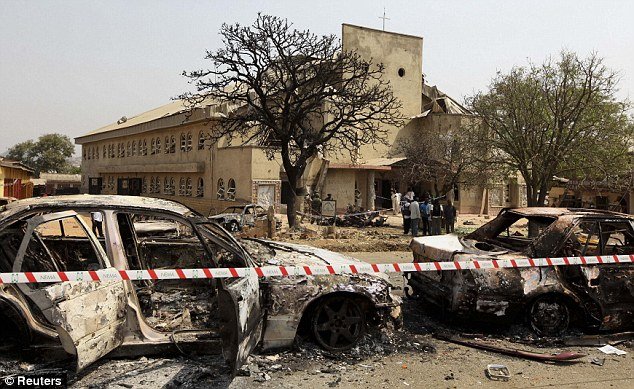
The Islamist group Boko Haram said it carried out the bomb attacks in Nigeria, including one on St. Theresa's Church in Madalla, near the capital Abuja, that killed 35
President Goodluck Jonathan, who is a Christian, said the attacks were an “unwarranted affront on our collective safety and freedom”.
The White House condemned what it described as “senseless violence” and pledged to assist Nigeria in bringing those responsible to justice.
Boko Haram – whose name means “Western education is forbidden” – often targets security forces and state institutions.
The group carried out an August 2011 suicide attack on the UN headquarters in Abuja, in which more than 20 people were killed.
Nearly 70 people have died this week in fighting between Nigerian forces and Boko Haram gunmen in the country’s north-east.
National Emergency Management Agency (NEMA) spokesman Yushau Shuaibu told the BBC that the latest Abuja explosion had happened in the street outside the church.
He said the church – which can hold up to 1,000 people – had been badly affected by the blast.
Witnesses said windows of nearby houses had been shattered by the explosion.
Officials at the local hospital said the condition of many of the injured was serious, and they were seeking help from bigger medical facilities.
Police had trouble controlling the anger of local people.
Reuters reports that thousands of youths have erected roadblocks on the road from the capital to the largely Muslim north, and are being tackled by security forces firing tear gas.
One of the Damaturu explosions was a suicide car bomb attack on a convoy of the State Security Service.
In Jos, a blast close to the Mountain of Fire and Miracles Church was followed by gunfire that left one officer dead, government spokesman Pam Ayuba told Associated Press.
Two explosive devices found in a nearby building were disarmed as military were deployed to the site.
The attack in Jos, in Plateau state, could have even more serious consequences than the attack in Abuja.
The state lies in Nigeria’s so-called Middle Belt, between the mainly Muslim north and Christian south.
More than 1,000 have been killed in religious and ethnic violence in Jos over the past two years and our correspondent says there will be fears that the latest attack could spark wider conflict.
A string of bomb blasts in Jos on Christmas Eve 2010 were claimed by Boko Haram.
President Goodluck Jonathan said after the latest attacks: “I want to reassure all Nigerians that the government will not relent in its determination to bring to justice all the perpetrators.”
[youtube kR_SWOZgdyg]
 Prev12Page 2 of 2
Prev12Page 2 of 2





















